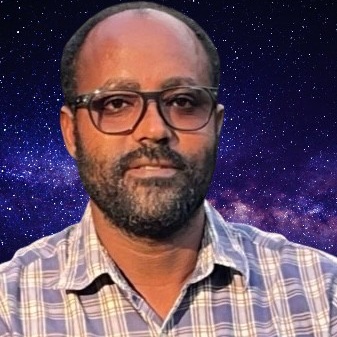After long days of teaching English in South Korea, Marcel van der Westhuizen would often find himself pondering the biggest questions imaginable: How will the universe ultimately end? His persistence and curiosity have now paid off.
The Institute of Physics (IOP) has published a special collection of papers featuring the research paper he co-authored with his supervisor Prof Amare Abebe, director of the Centre for Space Research at the North-West University (NWU). This collection celebrates significant research published as a result of South Africa’s transformative agreement in 2024, which aims to change publishing from subscription-based models to open access.
Their paper, ‘Interacting dark energy: clarifying the cosmological implications and viability’ explores a “non-gravitational interaction” between dark matter and dark energy.
“Our research looks at a non-gravitational interaction between two dark components and how this could lead to strange consequences, such as negative energies and even the universe ending in a future ‘big rip’,” Marcel explains.
He assures us that this scenario is still billions of years away and that it is just one of many possible scenarios.
For Prof Abebe, however, the value is more profound. “At a deeper level, this work also speaks to a fundamental aspect of what it means to be human: our innate curiosity and desire to understand the world around us," he reflects.
“Even when exploring concepts as distant as the ultimate fate of the cosmos, we are also trying to understand ourselves and our place within it.”
Identifying and solving problems: why it matters
The paper’s major breakthrough was identifying and solving significant issues with existing “interacting dark energy” models. They discovered that many established models require the existence of “negative energy,” which is a conceptually difficult idea.
“We found that this negative energy problem only occurs when dark matter decays into dark energy. However, this can be avoided if the decay is from dark energy to dark matter, which solves other problems too,” Marcel explains.
Although exploring the fate of the universe may seem abstract, it is important on Earth. According to Marcel, this kind of theoretical work elevates South Africa’s status in the global scientific community, leading to international collaborations and funding for major projects such as the Square Kilometre Array (SKA) in the Karoo.
“These science projects help to create jobs and develop South Africa’s infrastructure. Furthermore, they create opportunities for the next generation of students to work with world leaders and gain invaluable experience,” he adds.
Proud Moment
Marcel, who is currently pursuing his PhD, was initially taken aback by the news of this recognition. “I was not too sure about the significance of the selection,” he admits. “I then forwarded the email to my supervisor, Prof Amare, who told me that I should be proud.”
Prof Abebe says that this selection is an official stamp of approval on work that he already knew was exceptional. “The work was getting rapid citations, having been cited more than 45 times by major publications in the field in just over a year. This demonstrates the impact that the publication has had, and I am proud of Marcel’s excellent work on this. Official recognition from the publisher made me even prouder,” says Prof Abebe.
This paper has become personally significant for Marcel, as it symbolises an important turning point in his life and career.
“This was the first article I ever wrote. I worked on it over several months, late at night, after full days of teaching English in South Korea. When the first citations came in, it felt like validation that I had made the right choice to return to South Africa and pursue a PhD. This now feels like further confirmation that I made the correct decision to come back to research.”
Prof Abebe also sees a bright future ahead. “Marcel has published four follow-up articles since he started his PhD studies this year, and all of them are already being cited. This shows the bright academic future that awaits him, and I have no doubt that he will make many exciting contributions to the field in the years ahead.” Click the following link to access their full paper Interacting dark energy: clarifying the cosmological implications and viability

Prof Amare Abebe

Marcel van der Westhuizen
